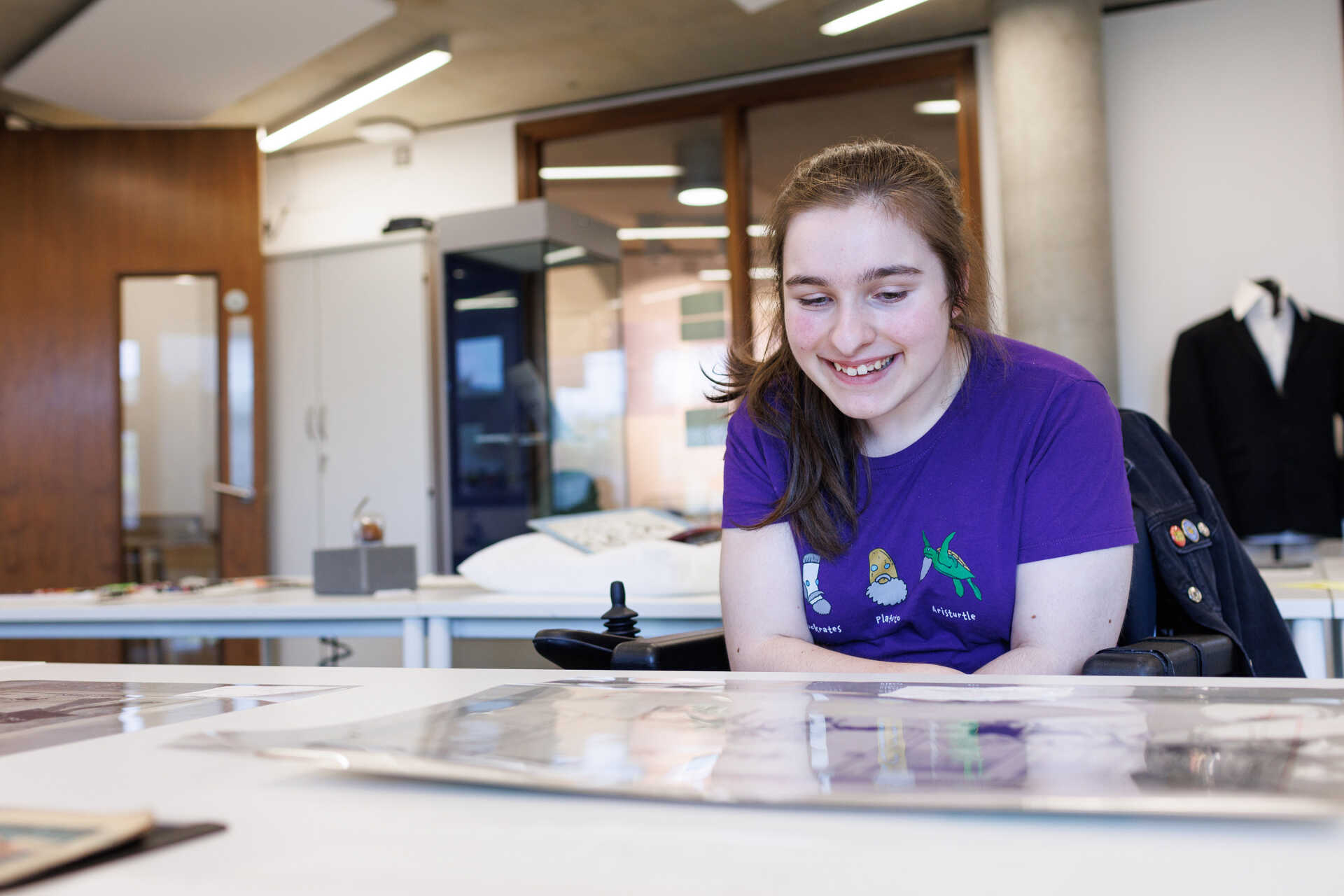Philosophy, Religion and Ethics
Ask challenging questions about the world around us, explore religious history and culture, and discover new perspectives on contemporary issues.

Ask challenging questions about the world around us, explore religious history and culture, and discover new perspectives on contemporary issues.
Reflect on the role of religion in contemporary life and society and develop the critical and analytical skills to engage with key philosophical questions and debates. Explore the major institutions and theological traditions of world religions, and develop the thinking, debating and problem-solving skills to shape your own future and the world around you.
Take a global approach and approach your studies from many perspectives and world views, considering how different ideas influence your own experiences and understanding. You have the option tailor your degree to your interests, enabling you to explore ethics, metaphysics, logic and reasoning, philosophical reading and writing, as well as an introduction to world religions.
You'll have the opportunity to deepen your understanding of worldviews and religions and delve into more specialist areas such as religion and film, ancient philosophy, the philosophy of language, and feminist philosophy. You might also choose to study abroad - a great opportunity to discover a new culture and show employers that you can adapt to a new environment.

Study a degree that opens doors to a wide range of opportunities.
96% of Philosophy students who completed the National Student Survey 2022 were satisfied with the overall quality of their course.

Study at one of our partner institutions, or boost your CV with a professional work placement.
Your Philosophy, Religion and Ethics degree will provide you with the key skills for a career in whatever field you want to explore.

Our wide range of modules cover topics from across Philosophy, Religion and Ethics. Choose to take a broad approach or specialise and find your niche.
BBB
Distinction, Merit, Merit
120 tariff points - typically H5 H6 H6 or equivalent
N/A
The University will consider applicants holding T level qualifications in subjects closely aligned to the course.
Obtain Access to Higher Education Diploma with 45 credits at Level 3 with 24 credits at Distinction and 21 credits at Merit
The following modules are offered to our current students. This listing is based on the current curriculum and may change year to year in response to new curriculum developments and innovation.

It’s wonderful being able to carve out my own academic path and to have been supported in that.Kyle Lovell, Philosophy BA
This module introduces some of the major works in ancient philosophy in relation to ethics, aesthetics, political theory, ontology and metaphysics. Students will study substantial portions of primary texts by the Presocratics, Plato, Aristotle the Epicureans, Stoics and/or the Skeptics. The emphasis throughout will be on the philosophical significance of the ideas studied. The module will concentrate on understanding key philosophical arguments and concepts within the context of the ancient intellectual tradition. This means that students will gain a critical distance from normative and modern definitions of philosophical terms in order to understand how ancient philosophy generally approached questions and problems with different suppositions and conceptions of reality, reason and the purpose of human existence.
Groups of marks or bursts of sound are just physical entities but, when produced by a writer or a speaker, they are used to point beyond themselves. This is the property of aboutness or intentionality. Other physical entities generally do not have this property. When you hear a sentence, you hear a burst of sound, but typically you also understand a meaning conveyed by the speaker. What is the meaning of a word – some weird entity that floats alongside the word, a set of rules associating the word with objects, an intention in the mind of the speaker….? What is the difference between what your words imply and what you convey in saying them? How are words used non-literally, how do hearers catch on to the meaning of a newly minted metaphor? How can we mean and convey so much when uttering a concise sentence? When someone says something offensive, is it part of its meaning that it is offensive, or just how it is used? In this module we shall try to find some answers to the questions listed above.
How does truth relate to existence? This module looks at the connection between truths and the things that make them true. We consider questions relating to the connection between truth and ontology (or existence) concerning time, persistence, possibility, generality, composition, and causation. We will look at how these issues are discussed in contemporary analytic metaphysics. We will explore both what solutions looking at the connections between truth and ontology might offer, whether this approach to the problems is useful, and how best to communicate the problems we discuss.
Is it right that the talented profit from their (undeserved) talents? Should the government provide compensation for people who find it hard to meet that special someone? Should we think our duties to our compatriots are more important than our duties to people in other countries?
This course is divided into two parts. The first part examines classic topics in political philosophy, such as Rawls Theory of Justice, Nozick's libertarianism and the feminist and communitarian criticism of political liberalism. The second part of the course will explore issues within contemporary political philosophy, such as equality, our obligations to those in the developing world, and the politics of immigration. We will consider whether we can make sense of political obligation between states as well as within states. We will look at these issues in the context of particular recent case studies.
This course is designed to introduce students to a number of approaches in what is often referred to as 'normative ethics'. We face and hear about moral problems every day. These problems range from life and death matters concerning abortion, euthanasia and the like to other types of case such as whether to tell a lie to prevent hurting someone's feelings. At some point we might wonder whether there is a set of rules or principles (such as 'Do not lie') which will help us through these tricky problems; we might wonder whether there is something more simple underlying all of this 'ethical mess’ that we can discern.
Normative ethics contains a number of theories that attempt to give us such principles and to sort out the mess. In particular, different normative ethical theories are attempts to articulate reasons why a certain course of action is ethically best; they are attempts to say what types of feature we should concentrate on when thinking about ethical problems and why it is that such features are features which have ‘intrinsic moral significance’. Of course, ethical theories do not exist in a vacuum. As we shall see, our everyday intuitions about what is morally best are both the origin of normative ethical theories and the origin of thoughts raised against them.
Many people today are reluctant to identify themselves as 'feminist': either because they see feminism as a useful political movement that has essentially served its purposes; or because they view feminism as a 'single-issue', militant ideology that they cannot identify with. This module is intended to give students an opportunity to reflect philosophically on what claims like this could mean: if we live in a post-feminist era, why do women earn, on average, two thirds of what their male counterparts earn? If we live in post-feminist era, why are women still under-represented in many fields (including politics, science and academic philosophy?). If feminism is a ‘single-issue’ ideology, why is it that feminists have proposed such a variety of solutions to the above problems, and from such a wide range of political standpoints?
The module explores some key debates in contemporary feminist philosophy, with particularly emphasis on its uncomfortable relationship with liberalism. The course draws attention to feminist critiques of key liberal concepts, such as consent, the social contract, autonomy, universal rights, and the private/public distinction. We go on to apply theoretical debates in feminist thought to the following political issues: prostitution, pornography, feminine appearance, multiculturalism, and human rights.
The course will begin by looking at various philosophical problems, as presented in films. This will involve discussing a range of different philosophical topics, from different areas of philosophy. Film here is presented as a way into the philosophical discussion, which will be supplemented by appropriate primary and secondary texts. The course will then consider ways in which the medium of film itself presents philosophical problems.
Topics to be covered will vary from year to year, in light of the expertise of the person convening it and student feedback from previous years. Philosophical issues presented through film will include, but will not be restricted to, time travel, existentialism and Philosophy of art. Philosophical Issues concerning film will include, but will not be restricted to 'is film art?', 'what is film?' and 'can film be philosophy?'
Through these and related topics, students will gain a good understanding of both a number of issues in philosophy, and the way that the medium in which philosophy is done is potentially a constraint on or a complement to the aims of the philosophy. The module will enable students to evaluate issues, both timely and timeless, in a manner that's informed by an interdisciplinary approach to philosophy.
Philosophers have conceived of their subject in a variety of ways, as rational systematisation, as a guide to the good life, as continuous with science, as dialogue, as critique, as therapy, and so on. In this module a small sample of topics will be chosen from a range of fields, for instance, ethics, politics, and science. Through team teaching, students are shown various—sometimes competing—ways to approach, discuss and respond to the chosen topics. This will include consideration of a number of techniques adopted by philosophers, such as, the use of the history of philosophy, conceptual analysis, thought experiments, formal philosophy, public philosophy and experimental philosophy.
The aim of this module is to enable students to think sociologically about religious life. Whilst addressing key debates within the sociology of religion (e.g. secularisation, subjectivisation), it seeks to introduce students to core concepts and methods in sociology that will enable them to understand religious life in terms of broader social structures and processes. Examples of issues covered in the module include: the nature of sociology as a discipline, macro and micro levels of analysis, the agency/structure debate and the nature of social structure, individualisation, and sociological perspectives on gender, class, emotion, materiality and belief. The significance of intersectionality between different social structures will also be discussed, and useful sources of secondary data (e.g. BRIN) will be explored. The central assessment task for the module – a case study presenting the sociological analysis of the nature and place of religion in a particular individual's life – brings these theoretical and methodological approaches together into a micro-level analysis of lived religion in a way that is informed by broader social and cultural structures. Examples of good writing in this style of sociological research are presented and explored through the module.
The primary aims of this module are to give students a critical grounding in current cultural theories of the sacred, to provide them with opportunities to explore how these concepts relate to contemporary social and cultural phenomena, and to reflect on how this process might help us to refine cultural theories of the sacred. The module will enable students to distinguish between ontological and cultural theories of the sacred, and will introduce them to key cultural theorists of the sacred such as Durkheim, Shils, Bellah, and Alexander. A range of cases will also be explored to provide students with opportunities to think about how relevant concepts might relate to specific social and cultural phenomena, and to provide a basis for the analytical work they undertake in their assessed work.
This module will evaluate and critique a range of historical, philosophical, theological and secular perspectives on death and the afterlife, beginning with the way the Hebrew Bible, New Testament, the Qu'ran, the Tibetan Book of the Dead and the Upanishads conceptualise the nature and destiny of humankind, including such concepts as sheol, moksha, purgatory, eternal life, heaven and hell. This will be followed by a discussion of the interplay in western theological and philosophical traditions between competing notions of the resurrection of the flesh and the immortality of the body as well as an evaluation of what various Christian thinkers, including Augustine and Origen, believed that an eternity in heaven or hell might be like.
The module will then investigate the range of eschatological teachings that different traditions have offered, including in Christian thought the diversity of realised and future forms of eschatology, as well as the tenability of purported testimony surrounding the possibility of out-of-body experiences, near-death experiences and mind-dependent worlds, and the way in which such endeavours have been sustained or critiqued in the light of scientific and historical advances.
The module will conclude with a detailed study of the way in which filmmakers and novelists have approached eschatological and apocalyptic teachings and reconceptualised them. This will be done with specific reference to Conrad Ostwalt’s work on the desacralisation of the apocalypse in Jewish and Christian thought in a range of 1990’s Hollywood science fiction movies, and the impact that such attempts have had on the way questions of life after death have conventionally been approached.
Theoretical philosophy is one of the main strands of contemporary philosophy. Among other things, theoretical philosophy addresses issues concerning the nature of reality (metaphysics), the nature of knowledge (epistemology), and the nature of correct reasoning (logic).
This module will introduce students to a range of issues and theories in theoretical philosophy. And students will learn to employ the methods of analytic philosophy to address questions such as: What is knowledge? How is knowledge possible? Is there a god? Do we have free will? What is the nature of time? What is causation? Is there one true logic?
Groups of marks or bursts of sound are just physical entities but, when produced by a writer or a speaker, they are used to point beyond themselves. This is the property of aboutness or intentionality. Other physical entities generally do not have this property. When you hear a sentence, you hear a burst of sound, but typically you also understand a meaning conveyed by the speaker. What is the meaning of a word – some weird entity that floats alongside the word, a set of rules associating the word with objects, an intention in the mind of the speaker….? What is the difference between what your words imply and what you convey in saying them? How are words used non-literally, how do hearers catch on to the meaning of a newly minted metaphor? How can we mean and convey so much when uttering a concise sentence? When someone says something offensive, is it part of its meaning that it is offensive, or just how it is used? In this module we shall try to find some answers to the questions listed above.
The aim of this course is to engage in the study of specific topics in the philosophy of mind, language, or action and to engage with the criticism of contemporary approaches as it is found in the works of Wittgenstein, Ryle, Anscombe, and/or Austin.
Logic is the study of the methods and principles used to distinguish correct reasoning from incorrect reasoning and, as such, it is a crucial component of any philosophy course. Moreover, logic has applications other than the testing of arguments for cogency: it is also a widely used and useful tool for clarifying the problematic concepts that have traditionally troubled philosophers, e.g., deductive consequence, rational degree of belief, knowledge, necessary truth, identity, etc. Indeed, much contemporary philosophy cannot be understood without a working knowledge of logic. Given this, logic is an important subject for philosophy students to master.
The module will primarily cover propositional and predicate logic. Regarding propositional and predicate logic, the focus will be on methods for testing the validity of an argument. These methods will allow students to distinguish correct from incorrect reasoning. The module will also cover inductive and modal logics. Regarding inductive and modal logics, the focus will be on clarifying epistemological concepts through the use of these logics.
Is it right that the talented profit from their (undeserved) talents? Should the government provide compensation for people who find it hard to meet that special someone? Should we think our duties to our compatriots are more important than our duties to people in other countries?
This course is divided into two parts. The first part examines classic topics in political philosophy, such as Rawls Theory of Justice, Nozick's libertarianism and the feminist and communitarian criticism of political liberalism. The second part of the course will explore issues within contemporary political philosophy, such as equality, our obligations to those in the developing world, and the politics of immigration. We will consider whether we can make sense of political obligation between states as well as within states. We will look at these issues in the context of particular recent case studies.
Many people today are reluctant to identify themselves as 'feminist': either because they see feminism as a useful political movement that has essentially served its purposes; or because they view feminism as a 'single-issue', militant ideology that they cannot identify with. This module is intended to give students an opportunity to reflect philosophically on what claims like this could mean: if we live in a post-feminist era, why do women earn, on average, two thirds of what their male counterparts earn? If we live in post-feminist era, why are women still under-represented in many fields (including politics, science and academic philosophy?). If feminism is a 'single-issue' ideology, why is it that feminists have proposed such a variety of solutions to the above problems, and from such a wide range of political standpoints?
The module explores some key debates in contemporary feminist philosophy, with particularly emphasis on its uncomfortable relationship with liberalism. The course draws attention to feminist critiques of key liberal concepts, such as consent, the social contract, autonomy, universal rights, and the private/public distinction. We go on to apply theoretical debates in feminist thought to the following political issues: prostitution, pornography, feminine appearance, multiculturalism, and human rights.
The module looks at various philosophical problems as presented in films. This will involve discussing a range of different philosophical topics, from different areas of philosophy. Film here is presented as a way into the philosophical discussion, which will be supplemented by appropriate primary and secondary texts. The course will then consider ways in which the medium of film itself presents philosophical problems.
Topics to be covered will vary from year to year, in light of the expertise of the person convening it and student feedback from previous years. At least some of the module will be devoted to philosophical issues concerning film will itself, such as whether film itself is or can be a form of philosophy.
Students will gain a good understanding of several topics in philosophy. They will also critically explore whether the medium in which philosophy is conducted is potentially a constraint on or a complement to the aims of the philosophy. The module will enable students to evaluate issues, both timely and timeless, in a manner that's informed by an interdisciplinary approach to philosophy.
This module introduces students to key issues in environmental ethics, the study of (a) the ethical relations and commitments of humans towards the non-human world, (b) the ethical standing of the non-human world itself, relating this study to the applied case of manmade climate change. The course is divided into a theoretical and a practical part. The theoretical part focuses on the conceptions of the environment in various traditions, and on the main theories of ethics, value, rights and duties. The practical part looks at applications of these theories, investigating the existing ethical approaches to the environment, before looking in more detail at the challenges of environmental destruction and manmade climate change.
Some questions which may be addressed: What are the main ethical theories? What are values, and do they even exist? What is the difference between positivist and natural right theories? What exactly is the environment/nature? Are humans part of nature or something else? Has something gone wrong in our relation to nature? Is all life sacred? To whom does the Earth belong? What has axiological priority – humans or the Earth (Gaia)? Do only humans have an intrinsic value or basic rights, or do such normative concepts also apply beyond humans? Can the paradoxes of collective action be overcome? What are the main ethical approaches to the environment? What are public goods, and in what relation do they stand to the planetary boundaries? Whose duty is it to prevent global warming? What is more important, preventing global warming or establishing social-economic justice? Through which political system can sustainability be best achieved? Who is to bear the costs of climate change? How might victims of climate displacement be compensated? What theory of justice is required to answer such questions? Do we owe anything to yet unborn humans? What do we owe to animals and plants, if anything? If it is too late to prevent the extinction of our species, what remains to be done?
This module will enable students to analyse and understand the development of Christian theology over the last two hundred years. We will be critically evaluating the significance and contribution of a number of leading twentieth century theologians from a variety of denominational backgrounds and endeavouring to understand to a sophisticated degree the changes in Christian thought and practice in a variety of situations in the twentieth century.
The module will begin by surveying the main strands of post-Enlightenment Christian theology, including the contributions of Kant, Schleiermacher and Feuerbach. There will be a detailed focus of two of the 'Death of God' theologians from the twentieth century, Thomas Altizer and William Hamilton. We will then critically evaluate the significance of Dietrich Bonhoeffer and his influence (with particular reference to Harvey Cox and John A.T. Robinson); Liberal Protestantism and the rise of Neo-Orthodoxy, with particular reference to Paul Tillich and Karl Barth; Rudolf Bultmann and his programme of demythologisation; and an interrogation of the Christian understanding of 'hope' with specific reference to Jürgen Moltmann. The module also involves a study of key theological movements, in particular Liberation Theology, Black Theology and Feminist Theology.
The aim of this module is to enable students to think sociologically about the complex forms that religion, ethics and belief has in people's lived experience. Whilst addressing key debates within the sociology of religion (e.g. secularisation, subjectivisation), it seeks to introduce students to core concepts and methods in sociology that will enable them to understand lived experiences and practices of religion, ethics and belief in terms of broader social structures and processes. Examples of issues covered in the module include: the nature of sociology as a discipline, macro and micro levels of analysis, the agency/structure debate and the nature of social structure, individualisation, and sociological perspectives on gender, class, emotion, materiality, lived ethics and the varying social forms and roles of belief. The significance of intersectionality between different social structures will also be discussed, and useful sources of secondary data (e.g. BRIN) will be explored. The central assessment task for the module – a case study presenting the sociological analysis of the nature and place of religion, ethics and belief in a particular individual’s life – brings these theoretical and methodological approaches together into a micro-level analysis of lived religion in a way that is informed by broader social and cultural structures. Examples of good writing in this style of sociological research are presented and explored through the module.
This module will evaluate and critique a range of historical, philosophical, theological and secular perspectives on death and the afterlife, beginning with the way the Hebrew Bible, New Testament, the Qu'ran, the Tibetan Book of the Dead and the Upanishads conceptualise the nature and destiny of humankind, including such concepts as sheol, moksha, purgatory, eternal life, heaven and hell. This will be followed by a discussion of the interplay in western theological and philosophical traditions between competing notions of the resurrection of the flesh and the immortality of the body as well as an evaluation of what various Christian thinkers, including Augustine and Origen, believed that an eternity in heaven or hell might be like.
The module will then investigate the range of eschatological teachings that different traditions have offered, including in Christian thought the diversity of realised and future forms of eschatology, as well as the tenability of purported testimony surrounding the possibility of out-of-body experiences, near-death experiences and mind-dependent worlds, and the way in which such endeavours have been sustained or critiqued in the light of scientific and historical advances.
The module will conclude with a detailed study of the way in which filmmakers and novelists have approached eschatological and apocalyptic teachings and reconceptualised them. This will be done with specific reference to Conrad Ostwalt’s work on the desacralisation of the apocalypse in Jewish and Christian thought in a range of 1990’s Hollywood science fiction movies, and the impact that such attempts have had on the way questions of life after death have conventionally been approached.
You have the opportunity to select elective modules in this stage.
Going abroad as part of your degree is an amazing experience and a chance to develop personally, academically and professionally. You experience a different culture, gain a new academic perspective, establish international contacts and enhance your employability.
You can apply to add a year abroad to your degree programme from your arrival at Kent until the autumn term of your second year. The year abroad takes place between Stages 2 and 3 at one of our partner universities. Places and destination are subject to availability, language and degree programme. For a full list, please see Go Abroad.
You are expected to adhere to any academic progression requirements in Stages 1 and 2 to proceed to the year abroad. The year abroad is assessed on a pass/fail basis and will not count towards your final degree classification.
The module will enable students to acquire knowledge and understanding of Wittgenstein's approach to philosophy, and to acquire familiarity with major themes especially in the areas of epistemology, metaphysics, philosophy of mind, and philosophy of language. The module will give students practice in deploying their critical philosophical skills.
The aim of this course is to engage in the study of specific topics in the philosophy of mind, language, or action and to engage with the criticism of contemporary approaches as it is found in the works of Wittgenstein, Ryle, Anscombe, and/or Austin.
Logic is the study of the methods and principles used to distinguish correct reasoning from incorrect reasoning and, as such, it is a crucial component of any philosophy course. Moreover, logic has applications other than the testing of arguments for cogency: it is also a widely used and useful tool for clarifying the problematic concepts that have traditionally troubled philosophers, e.g., deductive consequence, rational degree of belief, knowledge, necessary truth, identity, etc. Indeed, much contemporary philosophy cannot be understood without a working knowledge of logic. Given this, logic is an important subject for philosophy students to master.
The module will primarily cover propositional and predicate logic. Regarding propositional and predicate logic, the focus will be on methods for testing the validity of an argument. These methods will allow students to distinguish correct from incorrect reasoning. The module will also cover inductive and modal logics. Regarding inductive and modal logics, the focus will be on clarifying epistemological concepts through the use of these logics.
The module will study some of the major works in the history of modern philosophy of cognitive science and artificial intelligence. An indicative list of topics is: The Turing test; the Chinese Room argument; the frame problem; connectionism; extended and embodied cognition; artificial consciousness. The approach will be philosophical and critical, and will involve the close reading of texts. Students will be expected to engage critically with the works being studied and to formulate and argue for their own views on the issues covered.
Groups of marks or bursts of sound are just physical entities but, when produced by a writer or a speaker, they are used to point beyond themselves. This is the property of aboutness or intentionality. Other physical entities generally do not have this property. When you hear a sentence, you hear a burst of sound, but typically you also understand a meaning conveyed by the speaker. What is the meaning of a word – some weird entity that floats alongside the word, a set of rules associating the word with objects, an intention in the mind of the speaker? What is the difference between what your words imply and what you convey in saying them? How are words used non-literally, how do hearers catch on to the meaning of a newly minted metaphor? How can we mean and convey so much when uttering a concise sentence? When someone says something offensive, is it part of its meaning that it is offensive, or just how it is used? In this module we shall try to find some answers to the questions listed above.
How does truth relate to existence? This module looks at the connection between truths and the things that make them true. We consider questions relating to the connection between truth and ontology (or existence) concerning time, persistence, possibility, generality, composition, and causation. We will look at how these issues are discussed in contemporary analytic metaphysics. We will explore both what solutions looking at the connections between truth and ontology might offer, whether this approach to the problems is useful, and how best to communicate the problems we discuss.
Is it right that the talented profit from their (undeserved) talents? Should the government provide compensation for people who find it hard to meet that special someone? Should we think our duties to our compatriots are more important than our duties to people in other countries?
This course is divided into two parts. The first part examines classic topics in political philosophy, such as Rawls Theory of Justice, Nozick's libertarianism and the feminist and communitarian criticism of political liberalism. The second part of the course will explore issues within contemporary political philosophy, such as equality, our obligations to those in the developing world, and the politics of immigration. We will consider whether we can make sense of political obligation between states as well as within states. We will look at these issues in the context of particular recent case studies.
This course is designed to introduce students to a number of approaches in what is often referred to as 'normative ethics'. We face and hear about moral problems every day. These problems range from life and death matters concerning abortion, euthanasia and the like to other types of case such as whether to tell a lie to prevent hurting someone's feelings. At some point we might wonder whether there is a set of rules or principles (such as 'Do not lie') which will help us through these tricky problems; we might wonder whether there is something more simple underlying all of this 'ethical mess’ that we can discern.
Normative ethics contains a number of theories that attempt to give us such principles and to sort out the mess. In particular, different normative ethical theories are attempts to articulate reasons why a certain course of action is ethically best; they are attempts to say what types of feature we should concentrate on when thinking about ethical problems and why it is that such features are features which have ‘intrinsic moral significance’. Of course, ethical theories do not exist in a vacuum. As we shall see, our everyday intuitions about what is morally best are both the origin of normative ethical theories and the origin of thoughts raised against them.
Many people today are reluctant to identify themselves as 'feminist': either because they see feminism as a useful political movement that has essentially served its purposes; or because they view feminism as a 'single-issue', militant ideology that they cannot identify with. This module is intended to give students an opportunity to reflect philosophically on what claims like this could mean: if we live in a post-feminist era, why do women earn, on average, two thirds of what their male counterparts earn? If we live in post-feminist era, why are women still under-represented in many fields (including politics, science and academic philosophy?). If feminism is a ‘single-issue’ ideology, why is it that feminists have proposed such a variety of solutions to the above problems, and from such a wide range of political standpoints?
The module explores some key debates in contemporary feminist philosophy, with particularly emphasis on its uncomfortable relationship with liberalism. The course draws attention to feminist critiques of key liberal concepts, such as consent, the social contract, autonomy, universal rights, and the private/public distinction. We go on to apply theoretical debates in feminist thought to the following political issues: prostitution, pornography, feminine appearance, multiculturalism, and human rights.
This module will introduce students to classical as well as contemporary discussions in the intersection between politics, philosophy, and economics. Topics to be covered will vary from year to year, in light of the expertise of the person convening it and student feedback from previous years. Topics that may be covered include Authoritarianism, Behavioural economics, Rational Choice Theory, Game Theory, Libertarianism and Paternalism, Markets and Trade, Private Property and the Legitimacy of Organ Sale.
Through these and related topics, students will gain a good understanding of the complementary and in some cases conflicting perspectives and methodologies contained in politics, philosophy, and economics, and enable them to evaluate contemporary issues in a manner that's informed by a comprehensive set of relevant traditions.
In this module we consider what it is that history studies—individual actions, social structures, states, empires, religious movements, social classes, periods and regions, civilizations, large causal or law-governed processes. We explore whether history as a whole has meaning, structure, or direction, beyond the individual events and actions that make it up and the nature of causal influence among historical events or structures that underwrites historical explanations.
We continue by examining what is involved in our knowing, representing, and explaining history by asking what role is played by the interpretation of the lived experience" of past actors in our historical understanding
Students are required to identify a viable research focus or question for their project which they will then pursue, with supervisory support, in order to submit their final dissertation. In the summer before joining the module, students will be given advice on how to identify their research focus, and by the start of the autumn term in which the module begins they will be expected to have produced a single side of A4 summarising key literature or other sources relevant to their specific project. Individual supervision will begin from the autumn term onwards. Initially this is likely to focus on clarifying the research focus or question, and situating it more deeply in existing literature and debates. Following this a clearer outline plan for conducting the research will be developed, with students then undertaking work necessary to meet each phase of this plan. If the project involves original fieldwork, the student will be expected to submit a research ethics application form for Faculty approval. As the project develops, chapter drafts will be submitted for review and discussion with the supervisor. Supervision contact time is likely to vary according to the project and student need, but will not exceed a total of 6 hours per student (including face to face supervision or time spent writing written feedback to electronically-submitted drafts). Supervisors will provide feedback on chapter drafts, which will need to be submitted to supervisors in good time before supervision meetings, but will not provide feedback on whole draft manuscripts once chapters are completed.
Supervisors will only provide supervisory support during term-time. Once the project has been agreed and a supervisor allocated in the autumn term, students will not normally be allowed to change their fundamental focus of their project (although their specific questions are likely to change as the project develops) or change their supervisor unless in highly exceptional circumstances.
Ancient Chinese philosophies resonate in contemporary China and in the West. Philosophers compare Confucian and Aristotelean virtue ethics, read the Daoist text Zhuangzi alongside Nietzsche and describe Mohist thought as an early example of utilitarianism. Leaders of the People's Republic of China quote from the Chinese classics in their political speeches to enhance feelings of patriotism. Daoist concepts inspire practitioners of alternative medicine and systems biologists.
This module will explore key concepts, themes and practices in ancient Chinese philosophical literature, available in English translation. We provide the historical and cultural backgrounds of the emergence of the major 'schools' of thought (including Confucianism, Daoism, Mohism and Legalism) and examine how traditions interacted and transformed throughout Chinese history and how they influenced East Asian societies and became part of global culture. Hermeneutical and other methodological tools will be provided to engage with source material and answer questions about tradition and modernity, make cultural comparisons between East and West and discuss the translatability of concepts ranging from 'philosophy' to 'qi'. The module will also examine how ancient Chinese philosophies inform East Asian business ethics and social customs, literature and popular culture (in China and in the West) and ecological thinking.
The aim of this module is to enable students to understand and evaluate the range of models by which film and religion may be employed as conversation partners and to provide them with the tools necessary for exploring critical links between theology/religious studies and the medium of film. The course will begin with an examination of the methodological, conceptual and disciplinary issues that arise before exploring in critical depth the historical relationship between religion and film, with specific reference to the reception (ranging from prohibition to utilisation) of film by different religious groups. There will be a focus on particular categories of film and categories and models of religious and theological understanding, allowing students taking this module to develop the critical skills helpful for film interpretation and for exploring possible religious and theological approaches to film criticism.
In this module we will be looking at famous and obscure blasphemy cases, and asking why an old concept like 'blasphemy' continues to be so powerful today. We will analyse a range of recent cases in a variety of media, including Monty Python’s Life of Brian; The Satanic Verses; the Danish Cartoon Affair; Visions of Ecstasy; the Charlie Hebdo massacres in 2015; public Femen demonstrations; Pussy Riot; Bezhti; and the Gay News controversy over the homoerotic poem ‘The Love that Dares to Speak its Name’. However, we will also be looking at blasphemy in historical and global contexts. How have old British colonial laws been developed in Pakistan and India, for example? When was the last execution and imprisonment for blasphemy in the UK? ‘Blasphemy’ will be explored as a flashpoint for major controversies at the heart of modern democracies. These include the conflict between freedom of religion and freedom of speech, and the conflict between religion and sexual freedom.
This course considers the contested relationship between religion and the secular state, and the increasingly significant role of nonreligious identities and worldviews for understanding those states. Both religion and nonreligion have come to new prominence in the twenty-first century, prompting a re-evaluation of what role they should play in policy, law and society, and the nature and viability of political secularism itself. This course explores the key conceptual and theoretical debates shaping contemporary understandings of religion, nonreligion and the secular state, including the nature of secularity and secularism, the role of religious plurality and pluralism, multiple secularities and postsecular approaches, and the role of religion in political liberalism. The second part of the course explores case studies in detail, including differences and similarities between European (including Soviet), North American and Asian secularisms; the relationship between political secularism and the beliefs, practices and identities of local populations; and significant controversies (around blasphemy, reproductive rights and the right to wear religious clothing) and what they tell us about religion, nonreligion and political secularism in contemporary society.
Some modules have lectures, some have seminars, and all have class discussions. Some promote ‘student active’ learning techniques which encourage you to work on individual or group research, and present your findings to the rest of the class.
Assessment of philosophy modules is by essays, in-class assignments, seminar participation or tests, or a combination of these methods.
You are usually taught in small groups, with most modules involving either two or three hours per week in class, plus individual consultations with teachers as well as sessions on computing and library skills.
Stage 1 modules are normally assessed by 100% coursework. At Stages 2 and 3, some modules are assessed by 100% coursework (such as essays), others by a combination of formal examination and coursework.
For a student studying full time, each academic year of the programme will comprise 1200 learning hours which include both direct contact hours and private study hours. The precise breakdown of hours will be subject dependent and will vary according to modules.
Methods of assessment will vary according to subject specialism and individual modules.
Please refer to the individual module details under Course Structure.
For programme aims and learning outcomes please see the programmes specification for each subject below. Please note that outcomes will depend on your specific module selection:
As a Kent graduate, you will be ready to construct and lead engaging arguments, be quick to recognise context and skilled to propose alternative solutions. Career prospects for philosophy, religion and ethics graduates are wide ranging, with our students launching careers in everything from teaching through to the civil service. Being able to combine three key areas within your studies, enables you to develop critical skills that future employers will sit up and notice.
The creative problem solving, critical thinking and communication skills you develop at Kent can prepare you for a career in any field. The study of Philosophy, Religion and Ethics at Kent equips you with the adaptability to thrive in an exciting career in whatever area you are passionate about. This means Kent’s graduates are ready to step into a career of limitless opportunities, where you’ll have the talent and insight to build the career you want.

The course at Kent covered a broad range of philosophical topics and there were great choices in each year of the degree.

The 2024/25 annual tuition fees for this course are:
For details of when and how to pay fees and charges, please see our Student Finance Guide.
For students continuing on this programme, fees will increase year on year by no more than RPI + 3% in each academic year of study except where regulated.*
The University will assess your fee status as part of the application process. If you are uncertain about your fee status you may wish to seek advice from UKCISA before applying.
Fees for undergraduate students are £1,850.
Fees for undergraduate students are £1,385.
Students studying abroad for less than one academic year will pay full fees according to their fee status.
Find out more about accommodation and living costs, plus general additional costs that you may pay when studying at Kent.
Kent offers generous financial support schemes to assist eligible undergraduate students during their studies. See our funding page for more details.

We have a range of subject-specific awards and scholarships for academic, sporting and musical achievement.
We welcome applications from students all around the world with a wide range of international qualifications.
Student Life

In the QS World University Rankings 2024, Kent has been ranked 39th within the UK and is in the top 25% of Higher Education Institutions worldwide.
Kent Sport
Kent has risen 11 places in THE’s REF 2021 ranking, confirming us as a leading research university.

An unmissable part of your student experience.